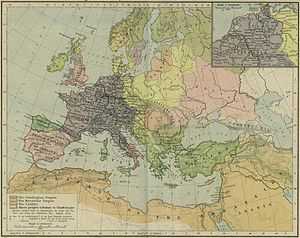Borna of Croatia
| Borna | |
|---|---|
| Duke of Croatia | |
|
Duke Borna of Croatia - monument in Otočac | |
| Reign | c. 810–821 |
| Predecessor | Višeslav (?) |
| Successor | Vladislav |
| Died | 821 |

Borna was the Duke (Knez) of Croatia from c. 810 to 821 and vassal of the Frankish Empire. Borna resided at Nin and was the ruler of most of the Croatians in northern Dalmatia.[1]
Biography
Borna is documented in the Royal Frankish Annals (Annales regni Francorum). He was the Duke of the Guduscani, a Croatian tribe from northern Dalmatia that lived along the river Guduča near Bribir.
In 819 Duke Ljudevit Posavski of Pannonia raised a rebellion against the Franks, while Borna remained loyal to the Frankish Emperor Louis the Pious and struck with his forces at his former traditional ally, bribed by the Emperor's offers of expansion of power. Borna moved with Ljudevit's father-in-law, Dragomuž, from the southeast. The famous battle of Kupa occurred at the river of Kupa. In the heat of Battle the Guduscans - an indigenous people of his realm - abandoned Borna and crossed to Ljudevit's side. Borna would have been killed at the battlefield, if not for his elite bodyguards, while Dragomuž was killed on spot.[2]
Ljudevit used the momentum of Borna's weakness and invaded the Duchy of Croatia in December of the same year. Borna's forces suffered heavy losses at the Battle of Kupa, so Borna decided that his forces should fight relying on attrition and exhausting of Ljudevit's troops. Harsh winter came to the hills of Borna's realm, further disabling Ljudevit's pillaging. Ljudevit was eventually forced to retreat, while much of their food reserves were left behind and confiscated by Borna. Borna reported his successes to the Frankish Emperor, stating that Ljudevit lost over 3,000 soldiers and 300 horses in his campaign.
Borna met with the Frankish Emperor in Aachen in January of 820, where they forged an alliance. The Emperor of the Franks prepared a massive invasion of Ljudevit's lands and those of his allies. Although the total invasion of Ljudevit's realm occurred, Borna died in the heat of battle in 821 after Ljudevit and his supporters retreated to the most fortified of their fortresses, hills and most unreachable swamps ad forests. He was succeeded by his nephew, Vladislav, also a vassal of the Carolingian Empire.
Ljudevit had no knowledge of Borna's death and at the beginning of 823, he went to Croatia in search of his uncle seeking help after he was dethroned and exiled. Borna's uncle, Ljudemisl, received him instead, who had Ljudevit tortured and killed. Although Ljudemisl could have ruled as a viceroy, the throne of Croatia passed on to Vladislav, Borna's nephew, for whom the source states that he was chosen by the people and confirmed by the Franks.[1]
Identity
Marquart, in Osteuropäische u. ostasiatische Streifzöge (1903), identified DAI's Porinos and Porga with Borna.[3] Krumbacher (1906) supported that Porinos and Borna were the same, but not Porga.[3] However, on the mere basis of the chronology of arrival and baptism in the 7th century, as well non Slavic origin of the personal names of early Croatian rulers in the 7th century, Porga could not be Borna or Branimir (r. 879-892), with whom some scholars tried to identify with.[4]
Titles
In the Royal Frankish Annals Borna is named "Duke of the Guduscani" (Latin: ducis Guduscanorum) in 818.[5] In 819 he is the "Duke of Dalmatia" (Latin: dux Dalmatiae),[6] while in 820 he is the "Duke of Dalmatia and Liburnia" (Latin: dux Dalmatiae atque Liburniae).[7]
References
- ↑ 1.0 1.1 John Van Antwerp Fine: The Early Medieval Balkans: A Critical Survey from the Sixth to the Late Twelfth Century, 1991, p. 255
- ↑ Carolingian Chronicles: Royal Frankish Annals and Nithard's Histories, p. 106
- ↑ 3.0 3.1 Karl Krumbacher (1906). Byzantinische Zeitschrift: Bibliographische Notizen und kleinere Mitteilungen, Volume 15. B.G. Teubner. p. 560.
5) Marquart, Osteuropäische u. ostasiatische Streifzöge (1903) p. XVIII, is right in identifying Porinos with Borna (Ann. r. Franc, s. a. 819). But he does not convince me that Porga is also the same, or that there was no actual foundation for the significance of the reign of Heraclius in Croatian history.
- ↑ Živković 2012, p. 54, 142-143.
- ↑ Annales regni Francorum DCCCXVIII (year 818)
- ↑ Annales regni Francorum DCCCXVIIII (year 819)
- ↑ Annales regni Francorum DCCCXXI (year 821)
Sources
- Constantine Porphyregonitus (1967). Moravcsik, Gyula, ed. De Administrando Imperio. R.J.H. Jenkins transl. Washington D.C.: Dumbarton Oaks Center for Byzantine Studies.
- Trpimir Macan: History of Croatian people, Zagreb 1999
- Nada Klaić: History of the Croats in the Middle Ages, Zagreb 1990
| Preceded by Višeslav (?) |
Duke of Croatia c. 810–821 |
Succeeded by Vladislav |
| |||||||||||||